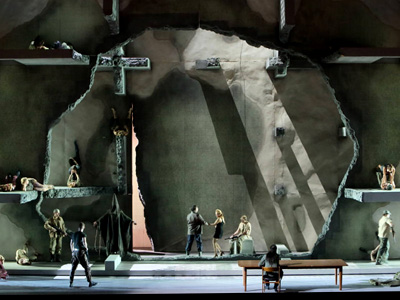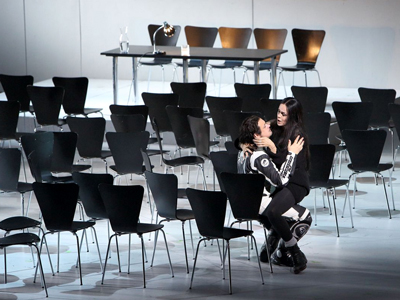
By ANDREW POWELL
Published: December 27, 2013
MUNICH — Martin Kušej’s new staging of La forza del destino for Bavarian State Opera opened Dec. 22 and is due for streaming tomorrow. Well cast, it alas trivializes the feud and the questions of honor and destiny that excited Verdi and his librettist Piave, despite being the busy company’s second try in eight years at this jumpy work.
At the second performance (Dec. 25), Anja Harteros soared as Leonora, her voice radiant and expressive. Nadia Krasteva’s Preziosilla sounded firmer than four years ago in Vienna, where she operated as a cowgirl. Jonas Kaufmann simulated tenorial heroics as Alvaro, but leaden tempos in Act III audibly strained him. Ludovic Tézier introduced a solid, resonant Carlo, Vitalij Kowaljow a menacing Guardiano (and Calatrava). Renato Girolami savored brief humor as a foam-container-meal-doling Melitone.
Though reportedly booed on opening night, conductor Asher Fisch ably commanded the structure and balances (as he had done for Don Carlo here in January 2012). His clinical discipline recalls the Verdi of Karajan without the orchestral megalomania, but also without Karajan’s flair in cantabile lines. Chorus and orchestra sounded splendid.
Kušej does not sustain the pace of Piave’s conception or inform its twists of fate. Instead he weakens the opera with banal settings and a political agenda all his own. Much of the time, we are on the premises of what appears to be a poor (American) evangelical church; Leonora gets a head-to-toe dunking in baptismal water. Visual references to Guantánamo and an Act III detour to Abu Ghraib, rather than propelling a feud, suggest anti-Americanism.
The production follows Verdi’s 1869 Milan score, modified in Act III according to a Franz Werfel scheme used for the 1926 Munich premiere of La forza del destino (under a 31-year-old Karl Böhm).
Photo © Wilfried Hösl
Related posts:
Kaufmann Sings Manrico
Boccanegra via Tcherniakov
Verdi’s Lady Netrebko
Portraits For a Theater
Manon, Let’s Go
